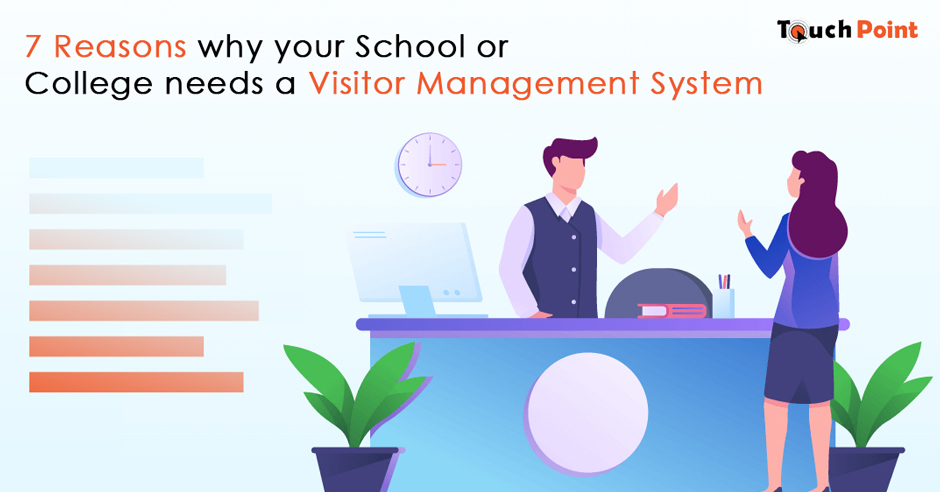On any given day anyone can walk into most schools or colleges without being stopped or questioned. There are a host of reasons why a school or college would want to screen people before they can enter the building, ranging from fear of violence to unresolved custody disputes, to the need to keep track of everyone in the building in case of an emergency.

“Some schools try to keep tabs on who is picking up smaller children and therefore require written forms that spell out who can pick up a child after school, an incomplete or faulty visitor procedure however, could cause confusion and allow a child to leave with the wrong person.”
Paper logs, in which a visitor writes his or her name and relationship to a student, along with the reason for the visit, are still the norm for the majority of K-12 schools today. The issue with these logs, of course, is that a visitor can use any name and unless there is someone who is overseeing the log and asking for the corresponding identification, a false ID will go undetected. Incorrect, incomplete or illegible paper sign-in systems also leave schools and colleges vulnerable if an incident occurs. If there is a fire or some other emergency that requires building occupants to take shelter in a particular place or evacuate, a school/college will need to have a comprehensive tally of who is in the building.
Ineffectiveness of using manual logs
Most schools and colleges have one or two security personnel and if at all they do record details of any visitors, they do it manually. However, paper logs or manual logs also run the risk of being damaged or forgotten in a crisis, and security personnel or first responders won’t be able to access the information remotely if they aren’t able to get to the office or room where the log is stored.
As a result of the inconsistencies of paper-based systems, schools and colleges require a competent visitor management system. This will tighten the reins over who can gain access to the school/college premises and mitigate the various issues that arise from the wrong people gaining access.
The next major reason why schools and colleges require a visitor management system is because currently even before visitors reach the sign-in or security at the gates there is no signage or guidance for them to follow. Schools and colleges should funnel visitors to a central location closing multiple entrances and winding hallways that present opportunities for visitors to bypass the main office or visitor center.
A clearly marked entrance and access-controlled system will send visitors in the right direction. Once inside, if the main office is far from the primary entrance, a visitor management system would enable security personnel near the authorized entrance to provide printed visitor passes so visitors can be met immediately
Another reason for the necessity of a visitor management system in schools and colleges is to pre-register all parents and frequent visitors, vendors or school/college district personnel with identification cards so they can have their badges or cards scanned and verified as they enter the building.
Some schools/colleges may tie this in with access codes on exterior card readers that allow visitors into the school/college at specific times. The cost of permanent ID cards can be more expensive than paper printed passes, but the upside is that they can contain information about the individual and can be “turned off” if a person’s status has changed.
Access control systems joined with video also allow schools and colleges to control visitation by identifying people before they enter campus. Through the use of exterior cameras, someone in the school office can view and identify the visitor and then grant or deny them access. This is therefore a very important reason why a visitor management system is required.
Some schools and colleges are installing lockdown buttons in the main office or classrooms, so if an intruder does gain access, they can quickly lock doors or restrict access.
Visitor management may be viewed as a time-consuming step by those trying to gain access to schools/colleges. Informing parents and frequent visitors in advance about the process and enforcing it on a consistent basis will not only make it less of a burden for those involved, but it will ultimately raise the level of protection for students and faculty alike.
Feelings of safety and comfort are key to overall productivity and success. Students and parents will feel more comfortable knowing that any strangers or guests on-site have been processed through a Visitor Management system and screened accordingly.
At their most basic level, Visitor Management systems perform the important task of tracking who is on the campus. More advanced Visitor Management systems can track when visitors arrive, limit where they are allowed to go, control the length of their stay and even screen them against publicly available background data.
Along with being a visible representation of security, processing visitors at the entrance of a school or college helps ensure that they are allowed to be on-site before they gain access to the building.